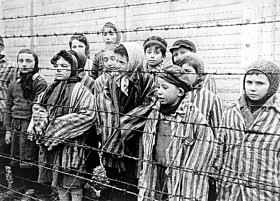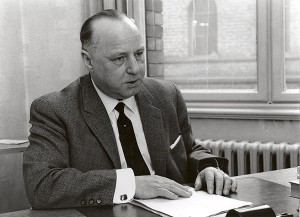
Surviving children in the main concentration camp, Auschwitz. This still from documentary footage shot by Alexander Voronzow shows Tomasz Szwarz, Alicja Gruenbaum, Solomon Rozalin, Gita Sztrauss, Wiera Sadler, Marta Wiess, Boro Eksztein, Josef Rozenwaser, Rafael Szlezinger, Gabriel Nejman, Gugiel Appelbaum, Mark Berkowitz, Pesa Balter, Rut Muszkies, Miriam Friedman, and Miriam and Eva Mozes. Licensed for the public domain by the United States Holocaust Memorial Museum.
Seventy years ago to this day, the Soviet Army liberated the death camps Auschwitz I and II. Almost ten years ago, the anniversary was designated International Holocaust Remembrance Day. Although I’ve been reflecting on representations of the Holocaust in art, literature, and philosophy for many years, I remain irritatingly little affected by today’s date, January 27. In most European countries, official events will once again collectively recall that breach of civilization and commemorate those who were systematically murdered. So too will Germany. Here, the decision to officially commemorate the victims of the Holocaust on this day was reached in 1996—not least because → continue reading
… the Auschwitz Trial Began 50 Years Ago Today
On 20 December 1963, Federal Germany’s largest and longest-lasting trial to date of crimes committed in National Socialist concentration and extermination camps opened in the council chamber of Frankfurt’s Römer, the city hall. On trial were twenty-two former staff members who had worked between 1941 and 1945 at the Auschwitz concentration camp. The highest-ranking defendant and last commandant of the camp, Richard Baer, had died just before the trial began. Many others did not face charges at all, not least because almost all crimes dating from the Nazi era were already time-barred—even homicide.

Hans Hofmeyer
© Schindler‐Foto‐Report
Since the Federal German legislature had not anchored the Allies’ postwar trials in Federal German law, trial proceedings in Frankfurt am Main—and likewise all subsequent trials of Nazi crimes—were based on the Penal Code of 1871. Consequently the only charges made were those of murder, and of aiding and abetting murder; and the court, under the guidance of the presiding judge Hans Hofmeyer, was accordingly obliged to find whether defendants had been personally involved in acts of murder, that is to say, had broken the law. → continue reading

